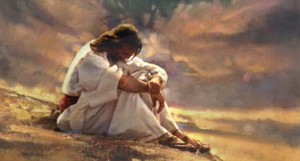37. Counter-Cultural Christ

Some began to spit at Him, and to blindfold Him, and to beat Him with their fists, and to say to Him, “Prophesy!” And the officers received Him with slaps in the face. (Mark 14:65)
Next comes Christ’s humiliation and torture.
Spat upon—He Who used His spit to heal a blind man was spat upon.
Every occurrence of spitting in the Old Testament has to do with uncleanness, derision and hatred. Leave it to Jesus to completely realign its purpose and use: And they came to Bethsaida. And they brought a blind man to Jesus and implored Him to touch him. Taking the blind man by the hand, He brought him out of the village; and after spitting on his eyes and laying His hands on him, He asked him, “Do you see anything?” And he looked up and said, “I see men, for I see them like trees, walking around.” Then again He laid His hands on his eyes; and he looked intently and was restored, and began to see everything clearly. (Mark 8:22-25)
Blindfolded—Those who were blind guides sought to make God in their own image.
Now when John, while imprisoned, heard of the works of Christ, he sent word by his disciples and said to Him, “Are You the Expected One, or shall we look for someone else?” Jesus answered and said to them, “Go and report to John what you hear and see: the blind receive sight and the lame walk, the lepers are cleansed and the deaf hear, the dead are raised up, and the poor have the gospel preached to them. And blessed is he who does not take offense at Me.” (Matthew 11:2-6)
And He came to Nazareth, where He had been brought up; and as was His custom, He entered the synagogue on the Sabbath, and stood up to read. And the book of the prophet Isaiah was handed to Him. And He opened the book and found the place where it was written, “The Spirit of the Lord is upon Me, because He anointed Me to preach the gospel to the poor. He has sent Me to proclaim release to the captives, and recovery of sight to the blind, to set free those who are oppressed, to proclaim the favorable year of the Lord.” (Luke 4:16-19)
Beat with fists—The One Who touched, held and healed with His hands, was beaten by fists.
While the sun was setting, all those who had any who were sick with various diseases brought them to Him; and laying His hands on each one of them, He was healing them. (Luke 4:40)
You, Lord, in the beginning laid the foundation of the earth, and the heavens are the works of Your hands. (Hebrews 1:10)
Mocked and yelled at—The One Who formed language was abused and mocked by it.
Then Moses said to the LORD, “Please, Lord, I have never been eloquent, neither recently nor in time past, nor since You have spoken to Your servant; for I am slow of speech and slow of tongue.” The LORD said to him, “Who has made man’s mouth? Or who makes him mute or deaf, or seeing or blind? Is it not I, the LORD? Now then go, and I, even I, will be with your mouth, and teach you what you are to say.” (Exodus 4:10-12)
Slapped in the face—The One Who told us to turn the other cheek endured the slaps.
But I say to you, do not resist an evil person; but whoever slaps you on your right cheek, turn the other to him also. If anyone wants to sue you and take your shirt, let him have your coat also. Whoever forces you to go one mile, go with him two. Give to him who asks of you, and do not turn away from him who wants to borrow from you. (Matthew 5:39-42)
So what was it that caused Him to endure all this? Well, He did it for us. Consider the following: Who for the joy set before Him endured the cross, despising the shame, and has sat down at the right hand of the throne of God. For consider Him who has endured such hostility by sinners against Himself, so that you will not grow weary and lose heart. (Hebrews 12:1-3)

